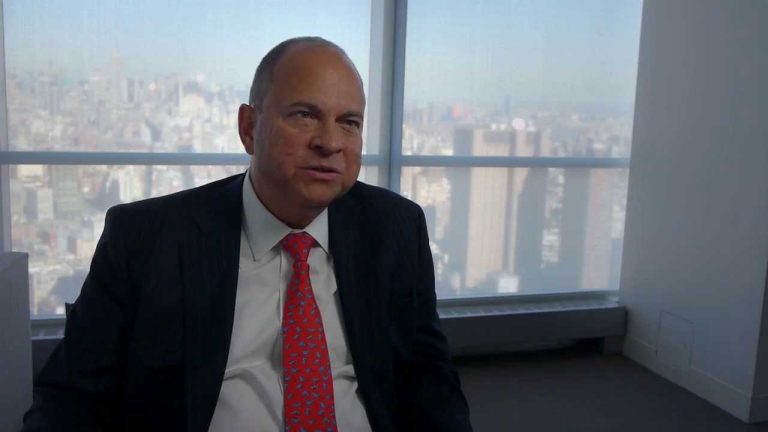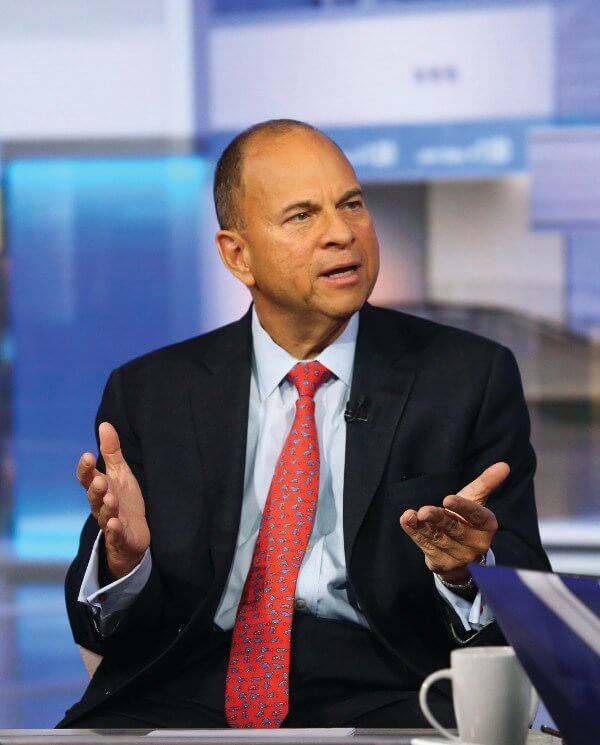15 de junio 2016

Children of Exile: The Births “Sowing Hope” in the Camp of Nicaraguan Farmers

PUBLICIDAD 1M
PUBLICIDAD 4D
PUBLICIDAD 5D
Henry Fernandez is the head of MSCI, a company with a market value worth 7 billion dollars

The first time Henry Fernandez made news headlines was when he was a little over four years old. Being mischievous, he started his parents’ car which then rolled down a hill. He crossed roads and buildings… He didn’t stop until some baseball players held onto the car and brought the car to a stop. The newspapers called him the “Boy at the Wheel”.
Now, newspapers are writing about him again, not because of his recklessness but because of his business success. Today, Henry Fernandez takes risks of a different kind. With degrees from universities such as Georgetown, Princeton and Stanford, Fernandez is the chairman at MSCI, a company with a market value worth 7 billion dollars raking in 1.1 billion dollars in sales per year. MSCI employs three thousand professionals across 25 countries. “We create products for people who manage global businesses,” he explains.
He’s dodged death a few times and prefers literature to music. He likes to dig up works by Latin American authors such as Pablo Neruda, Gabriel Garcia Marquez and Mario Vargas Llosa. All he has to do to meet Vargas Llosa is to pick up the telephone, which he says he still hasn’t done. He studied with three Nobel Prize winners in economics. “What I’ve learnt from being near them is to keep your mind lucid, the way they are able to simplify problems in the most amazing way so as to provide great solutions,” he emphasizes.
If he could invite anyone to have a coffee it would be the physicist Albert Einstein. He would like to discuss an important problem with him and see how he would resolve it.
World citizen

Henry A. Fernandez has three nationalities. He is Mexican by birth, Nicaraguan by descent and a US citizen by adoption. He was born in the North and not in the center of the Americas, because his parents came to Mexico in the 1950s – at the time of Maria Felix, Cantinflas and Agustin Lara – in order to “help improve” his younger brother’s health condition, who suffers from cerebal palsy. They also went to Mexico because of political reasons. His father, Armando Fernandez, had held a high rank in the National Guard.
Henry Fernandez has degrees from prestigious universities such as Georgetown, Princetown and Stanford.
Born to Nicaraguan parents, Henry was registered in the records of Nicaraguan nationals born abroad. “I grew up with a strong sense of patriotism, but a really, really strong feeling (…) also because I hadn’t been born in Nicaragua, I wanted to convince myself that my patriotism was stronger than that of anybody else,” he said.
He lived on Nicaraguan soil and traveled across the country for over a decade. His father was constantly resettled all over the country. That’s how he got to see different cities in Nicaragua before his family settled in Managua. He lived in Managua until he was 16 years old and then went on to study economics in the US. “A lot of my future plans and dreams in life were about how I could help Nicaragua develop economically, socially and politically so it could become a more prosperous country,” he highlights.
He traveled a lot and went to over 30 countries. When the Sandinista Revolution took place, he was in the south of China. First, he wanted to finish his degree and then return back to Nicaragua. However, after 19 July 1979, he changed his mind. There was a profound change “from this patriotic person who loved his country to a person who burned his bridges and decided that I had no future in Nicaragua,” he claims.
He graduated with honors in Economics at Georgetown University. He then went on to study an MBA at Stanford University and a doctorate in Economics at Princeton University. He was 25 years old at the time and his immigration status was hanging on a thread. He’d been denied political asylum in the US and they wanted to extradite him. It was like this for 7 years.
From University to Wall Street
Henry Fernandez not only learnt how to manage companies but how to create them. “I wanted to become an entrepreneur,” he stresses. He set himself the challenge of entering Wall Street, to learn about how its stock market goes up and down and how to manage a company in a global context. I wanted to reach the “highest peak in New York’s financial world, in the US’ financial capital,” he admits.
A dog eat dog world. Competitive to say the least. Even more so for someone from the outside. He fought for his place at Morgan Stanley which was “an investment bank” back then. “I entered as what they call an ‘Associate’,” he explains. They interviewed thousands of applicants and were only offering 15 positions in two branches: Corporate Finance and Mergers and Acquisitions.
Out of those 15, only one or two of them could become associates. He wanted to be one of them. “I set myself the goal of becoming one of this company’s associates and I was willing to work tooth and nail, do whatever it took to achieve this. Eventually, after 10 years at Morgan Stanley, I became an Associate,” he tells us.
Henry Fernandez 2 pgHe didn’t want to become a banker, but their client. He wanted to buy a company or found a new one. At 30 years old, he was almost on the verge of becoming the General Director of a bank in Buffalo, New York. He managed to get investors who were willing to put up the capital he needed in order to acquire the bank, but his proposal fell apart. It was a huge disappointment, he confesses.
This experience helped him discover that his work was eating him alive. Determined to socialize more and work less, he met his wife. In 1991, he decided to leave Morgan Stanley and create his own business. “I founded it with the view (that) we would buy US and Mexican companies. I founded it along with three other partners. We began to get it off the ground and search for companies,” Fernandez explains.
That’s how he bought small media outlets: newspapers, radio stations… In 1994, he closed the company and went back to Morgan Stanley. Until he finally had an idea. There was a product that Morgan Stanley had bought which generated little revenue and “it was then that I decided to take over this business. The central office was in Geneva, Switzerland.
For two years, he worked for Morgan Stanley during the day and at nighttime, he made his life difficult searching for a way to get this business, which nobody took notice of, up off the ground. “I left my career in the Main (the central office) at Morgan Stanley and I threw myself into a tiny corner which everybody ignored and if I hadn’t achieved anything in five to ten years, it would have been an enormous failure. The rest of my colleagues were going up the company ladder winning pay rises and compensation and there I was stuck. Obviously the company couldn’t pay me and they were subsidizing me,” he adds.
That was 20 years ago. With the support of his bosses, he was able to take this project on full-time and moved to Geneva. He stayed there until the business got going. “This was the forerunner to today’s company which we eventually placed on New York’s stock market. We then left Morgan Stanley and it’s now a global company,” he highlights.
It was founded as Morgan Stanley Capital International but when it broke away from its mother company, it abbreviated its name to MSCI.
Today, this company has three thousand professionals working in 25 different countries. 50% of them have a Masters degree at the least. 120 employees have doctorates in Finance, Economics or Mathematics.
MSCI has 3000 clients in 90 countries. The firm now boasts a market value worth over 7 billion dollars. Fernandez is a stockholder in the company which belongs to Morgan Stanley.
“We create tools for professionals who deal with money around the world, so they can easily manage their investments,” he explains.
He is usually on business trips visiting clients or going to offices where they manage their business transactions. He travels from New York to London. From Paris to Tokyo. He has visited over 100 countries in his lifetime. He’s even escaped death a few times. The last time, when he didn’t board an airplane he was supposed to travel on. There was an electric fault on the plane and it exploded and crashed in Canada. A financial crisis saved his life that time.
Life between Meetings
Henry Fernandez now lives in New York. He has decided to set up his company’s headquarters there. His spends his time in meetings. Meetings. And more meetings.
He’s glued to technology 24/7. Most of his day is spent answering emails: He has breakfast with his children. He answers emails. He has dinner. He answers more emails. Weekends. Emails. Holidays…
“I don’t work, this is a hobby for me. I truly believe I’m blessed by God because I work in something I really enjoy doing. I don’t have to pay anything to do it, but am paid to do it. It’s extremely satisfying and I wouldn’t be able to do all this if I didn’t enjoy what I do everyday immensely,” he clarifies.
Reading about the economy, politics and market trends is his hobby. He learns and continues to learn. His refuge: film. He rents movies. Documentaries, action flicks, drama. He wasn’t born an athlete, but became one. “I was always more of an academic than an athlete but I married my wife who is very athletic and she has instilled sports in my children. All of my children are athletes. I say athletes, but what I mean is that they compete, train and are captains of their school teams.” He has three children: two boys and one girl.
In 40 years, he’s only been back to Nicaragua once. That was back in 2014. He came, he enjoyed the country of his childhood and then he left. When asked which of his nationalities he feels the closest to, he responds none of them. He’s “a world citizen,” he claims.
“But at the end of the day, whenever anybody asks me ‘Where are you from?’, I always say Nicaragua.”
This article has been translated from Spanish by Havana Times.
Archivado como:
PUBLICIDAD 3M
PUBLICIDAD 3D